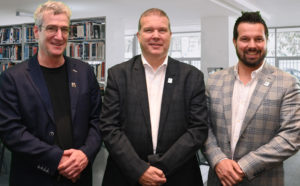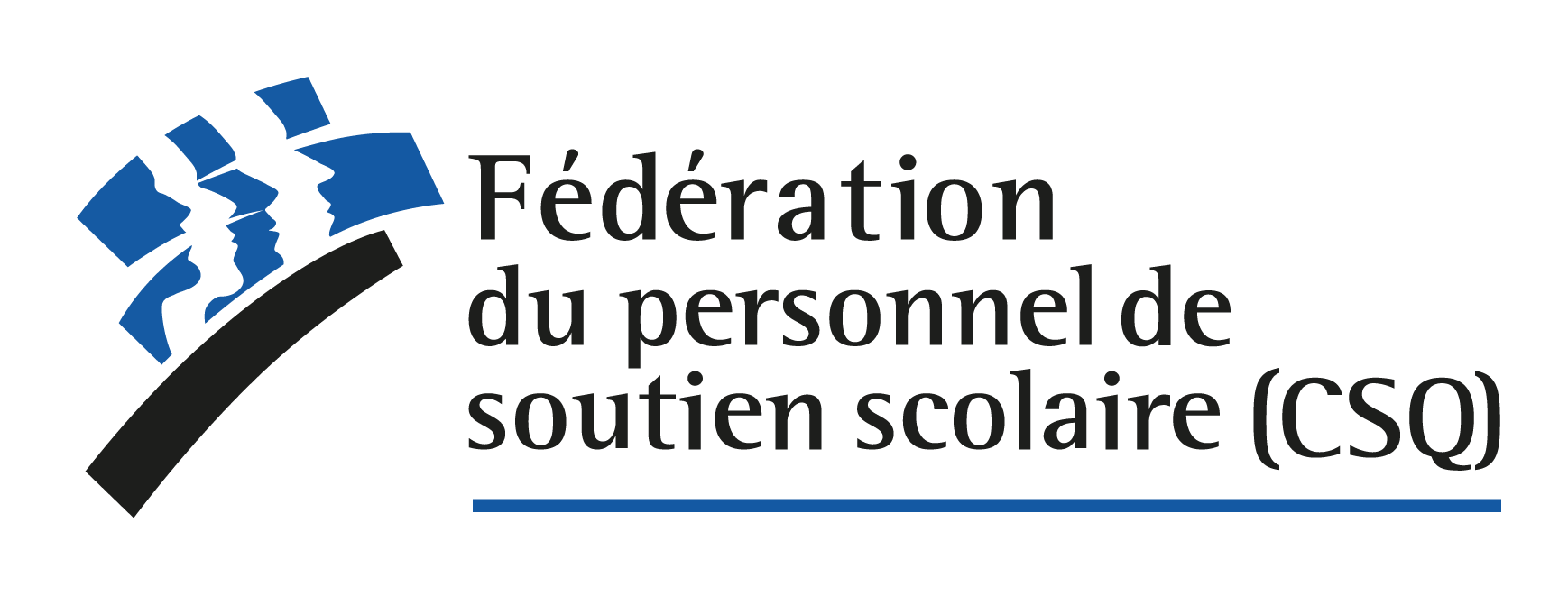About
The Fédération du personnel de soutien scolaire (CSQ) is:
- The only Quebec federation that exclusively represents school support staff in schools and centres. It is affiliated to the Centrale des syndicats du Québec (CSQ).
- The development of expertise in every field of professional interest to its members, including:
- complementary services to students: special education, daycare, student supervision, laboratories, recreation, documentation, etc.;
- the manual and skilled trades sector;
- the administrative, secretarial, technical and paratechnical sector.
- With its structure, it is a federation that is close to the realities and needs of its members with regard to the negotiation and application of their working conditions.
- A commitment to maintain and support local unions to make them strong, reasoned and able to handle labor relations and defend their members. In this regard, federation employees use their expertise to train local union teams and support them in their technical, political and legal responsibilities. Information and training play an important role in our relationship with local union officers.
- Close to 43 000 members in school boards across the province.
The Fédération du personnel de soutien scolaire (CSQ):
- Benefits from the CSQ’s expertise in education and public services.
- Takes advantage of privileged ties with teachers and professional staff in the world of education to create inter-category relationships for quality collaboration in everyday affairs and in high-intensity periods of negotiations.
- Is autonomous and exercises its power and influence within the CSQ on behalf of support staff.
- Fights for respect of its members and their working conditions.
- Regularly informs its members on various issues.
- Is attentive and respectful of the member’s right to speak with the adoption of its statement of principles.
- Helps local unions to improve their status within the organization by providing a financial structure that promotes the participation of FPSS-CSQ affiliates, in order to:
- Ensure a dynamic and active union presence within the organization;
- Demonstrate a genuine local availability to meet, greet and listen to members;
- Monitor and defend issues at the local level;
- Take concrete actions to ensure that the working conditions of its members are respected;
- Empower representatives of local unions to help them fulfill their duty to represent their members, both locally and provincially;
- Assume its responsibility and be recognized as vital to the daily affairs of local unions.
The Fédération is comprised of 20 affiliated unions
History
School support staff have been associated with the CSQ, formerly the CEQ, since 1974 as part of the Fédération du personnel de soutien, a federation that included support staff from school boards, colleges and universities.
In August 1998, delegates of the different groups decided to split the federation to better respond to the political, professional and working conditions of their respective members. The Fédération du personnel de soutien scolaire is a young, open, modern and dynamic federation.
Structure and Services
The Local Union
The local union is the cornerstone between the members, the Federation and the Centrale, expressing the wishes of the members, delivering information from the Federation and the Centrale and ensuring the representation and defense of members in their respective sectors.
The Congress
The Congress is held every three years to evaluate the work accomplished in the previous triennial and decide on the major orientations of the FPSS-CSQ for the next triennium.
The Federal Council
The Federal Council is composed of close to fifty official delegates and substitutes appointed by the local unions.
It meets at least four times each year, a pace that intensifies in negotiating years in order to ensure the participation and direct involvement of members in the consultation and negotiating process.
Among other things, it makes decisions on:
- the negotiation of collective agreements;
- the consultation and updating of the Classification Plan;
- positions and professional issues specific to support staff;
- political orientations upheld by the Federation;
- the Federation’s annual plan of action;
- the Federation’s budget;
- any other topics of interest to school support staff.
You can consult the PDF document of the FPSS-CSQ profile
The Executive Committee

From left to right: Stéphane Soumis, Vice President of Communications, Training, the Secretariat and the Treasury. Éric Pronovost, President. Dominic Latouche Vice President of Labour Relations and Professional Affairs.
The Executive Committee handles the day-to-day management of Federation affairs and manages the Federation’s property.
It implements and applies decisions handed down by the Federal Council, providing technical and political support to elected representatives of local unions.
A Secretarial Team
The secretariat team
Aside from all the staff at the Centrale, the Federation has its own specific team to handle its day-to-day affairs, namely a secretary in our Montreal office, Virginie Delaby-Fina, and three legal secretaries: Louise Lefebvre in our Montreal office and Josée Beaupré and Annie Paradis in our Quebec City office.
A Team of Advisors
The advisors are assigned to three different unions. They have a three-part mandate: to advise on the interpretation of working conditions, to train local union representatives and to defend our members, whether in grievance arbitration or before the Tribunal administratif which exists under the Act Respecting Industrial Accidents and Occupational Diseases.
Montreal office:
Mélanie Baril, Labor Relations Advisor
Charles-David Brulotte, Legal Advisor
Martin Cayouette, Communications Advisor
Pierre Charland, Labor Relations Advisor
Julie Ducharme, Legal Advisor
Réal Policar, Labor Relations Advisor
Marie-Pier Véronneau, Labor Relations Advisor
Quebec City office:
Kassandra Légaré, Labor Relations Advisor
Annick Gosselin, Professional Affairs Advisor
In addition to this team, there are also various CSQ consultants working on issues related to provincial negotiations, pension plans, group insurance, professional action, communications, action-research, etc.
Federal Council
Composition
The Fédération du personnel de soutien scolaire (FPSS-CSQ) represents more than 40,000 employees working in 25 school boards, who are members of 20 unions spread throughout Quebec.
Decision-making Bodies
The Federal Council (CF) is the decision-making body of the FPSS-CSQ between the triennial congresses. There are at least 4 meetings of the council each year where about 50 delegates appointed by their unions are given the opportunity to actively participate in the decision-making process. It adopts the budget, budgetary revisions and financial statements, it forms any committee it deems appropriate and, among other things, takes any decision likely to encourage school support staff to participate in union affairs.
It also ensures political control over negotiations. It studies and adopts, among other things, the contents of provincial demands and the final acceptance of an agreement. It is composed of the Executive Committee, union delegates and members of the negotiating team who are also members of local unions.
Congress
The Congress is the supreme body of the Fédération du personnel de soutien scolaire (FPSS-CSQ). It is a triennial event where we review what was accomplished during the previous three years and decide on the orientations that will guide our actions in the following three years.
This is why local unions appoint more delegates to attend the Congress than for Federal Councils, thus allowing for a broader debate.
Aside from discussing the major orientations and adopting amendments to the Federation’s bylaws, regulations and policies, delegates also elect the members of the FPSS-CSQ Executive Committee during the Congress.
Professional Affairs Committees and Working Tables
These are created to address specific or ongoing needs related to the professional concerns or working conditions of our members.
They are composed of members of local unions or Federal Council delegates, one member of the Executive Committee and, depending on the subject matter, Federation or Centrale advisors may be assigned to assist.
The Comité d’interprétation, de formation et d’application de la convention collective (CIFACC).
Since the local union is where most of the daily action takes place, the Federation organizes regular meetings, in addition to training offered by the Centrale, of local union representatives to provide training in working conditions and labour laws and develop expertise.
